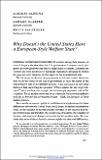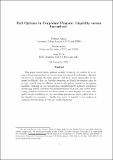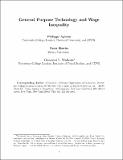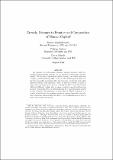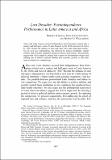Search
Now showing items 1-10 of 435
Contagious bank failures in a free banking system
(Elsevier BV, 2000)
This paper develops a model of an unregulated banking system based around a private clearing house arrangement. Whilst such a system may dominate one with a public safety net in reducing moral hazard in lending and therefore ...
Competition, Imitation and Growth with Step-by-Step Innovation
(Oxford University Press (OUP), 2001)
Is more intense product market competition and imitation good or bad for growth? This question is addressed in the context of an endogenous growth model with “step-by-step” innovations, in which technological laggards must ...
Why Doesn't the United States Have a European-Style Welfare State?
(Johns Hopkins University Press, 2001)
European countries are much more generous to the poor relative to the US level of generosity. Economic models suggest that redistribution is a function of the variance and skewness of the pre-tax income distribution, the ...
Justice and Allocation in International Health Aid
(SAIS Johns Hopkins University, 2007)
Exchange Rate Volatility and Productivity Growth: The Role of Financial Development
(Elsevier, 2009)
This paper offers empirical evidence that real exchange rate volatility can have a significant impact on long-term rate of productivity growth, but the effect depends critically on a country’s level of financial development. ...
Exit Options in Corporate Finance: Liquidity versus Incentives
(Oxford University Press (OUP), 2004)
This paper provides a first study of the optimal design of active monitors' exit options in a problem involving a demand for liquidity and costly monitoring of the issuer. Optimal incentives to monitor the issuer may involve ...
General Purpose Technology and Wage Inequality
(Springer Science + Business Media, 2002)
The recent changes in the US wage structure are often linked to the new wave of capital-embodied information technologies. The existing literature has emphasized either the accelerated pace or the skill-bias of embodied ...
Safety in Markets: An Impossibility Theorem for Dutch Books
(2007)
We show that competitive markets protect consumers from many forms of exploitation, even when consumers have non-standard preferences. We analyze a competitive dynamic economy in which consumers have arbitrary time-separable ...
Growth, distance to frontier and composition of human capital
(Springer Science + Business Media, 2006)
We examine the contribution of human capital to economy-wide technological improvements through the two channels of innovation and imitation. We develop a theoretical model showing that skilled labor has a higher ...
Lost Decades: Postindependence Performance in Latin America and Africa
(Cambridge University Press (CUP), 2007)
Africa and Latin America secured independence from European colonial rule a century and half apart: most of Latin America by the 1820s and most of Africa by 1960. Despite the distance in time and space, they share important ...




